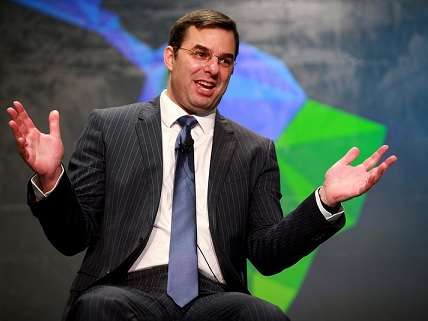Justin Amash: Fight for Marriage Freedom Not Over Until Government Gets Out of Marriage
Love hasn't won for everyone yet.


Have you heard the news that the Supreme Court recognized the right to marry, irrespective of sexual orientation (but still limited to a union of two), as a constitutional right? Maybe you saw it on Facebook? Or in a promotion from your favorite corporate brand? The ruling ought to eliminate shenanigans like this one and insofar as it opens access to benefits for same-sex couples that opposite-sex couples enjoy and overturns outright bans on gay marriages it's a victory for equality and freedom. In his dissent, Chief Justice John Roberts worried that recognizing gay marriage might lead to recognizing polygamy. Most on the left rejected that argument as outlandish, which is worrying—"love wins" when people who love each other can enter into any kind of contractual relationship they want, irrespective of their race, gender, or number. There may be more marriage equality today than there was yesterday but there's still an untold number for whom marriage equality doesn't exist. That number is untold because polygamy is against the law so most polygamists hide their marital status. Maybe in 10 or 20 years' time, "society" will be ready to accept polygamy as the Court judged it was ready to accept gay marriage today.
But there's a way toward total marriage freedom that doesn't require the creation of more layers of government privilege. Rep. Justin Amash, a libertarian Republican from Michigan, hit on that path in a Facebook post he put up about today's ruling. It reads, in part:
For thousands of years, marriage flourished without a universal definition and without government intervention. Then came licensing of marriage. In recent decades, we've seen state legislatures and ballot initiatives define marriage, putting government improperly at the helm of this sacred institution.
Those who care about liberty should not be satisfied with the current situation. Government intervention in marriage presents new threats to religious freedom and provides no advantages, for gay or straight couples, over unlicensed (i.e., traditional) marriage. But we shouldn't blame the Supreme Court for where things stand.
To the extent that Americans across the political spectrum view government marriage as authoritative and unlicensed marriage as quaint, our laws must treat marriage—and the corresponding legal benefits that attach—as they would any other government institution. So, while today's Supreme Court opinion rests upon the false premise that government licensure is necessary to validate the intimate relationships of consenting adults, I applaud the important principle enshrined in this opinion: that government may not violate the equal rights of individuals in any area in which it asserts authority.
Getting government out of marriage may be a lot more difficult than it seems, and not just because of the tax code. It's certainly turned out to be easier, or more politically feasible, to extend access to same-sex couples. Perhaps it's also more politically feasible to extend access to polyamorists than it is to remove government from marriage, even though the former seems as impossible a task as the latter right now. But, maybe, as marriage equality is extended to more people, it'll become harder for government to manage and therefore easier to disentangle government from a deeply personal institution, freeing people to love who they want, express it the way they want and agree on the terms and conditions amongst themselves the way they want without the government getting to decide what they "deserve."
Read important coverage of today's decision from Damon Root, Scott Shackford, Robby Soave, Stephanie Slade, Peter Suderman, and Jesse Walker.
